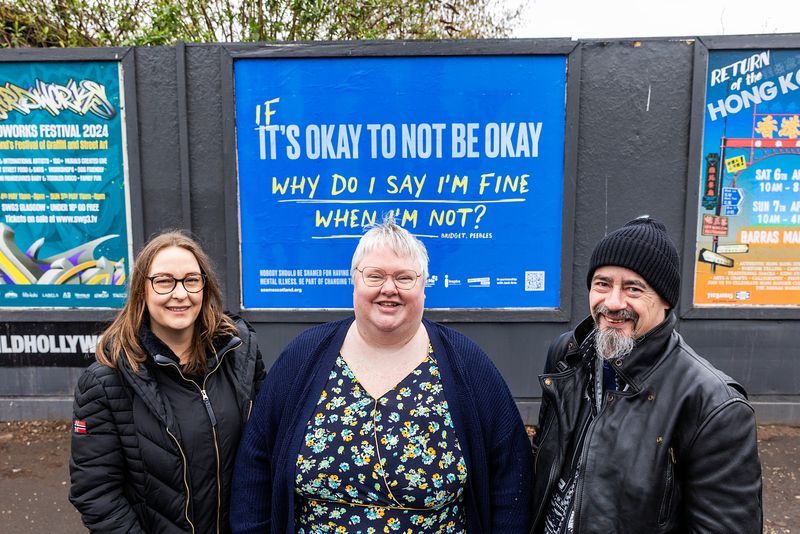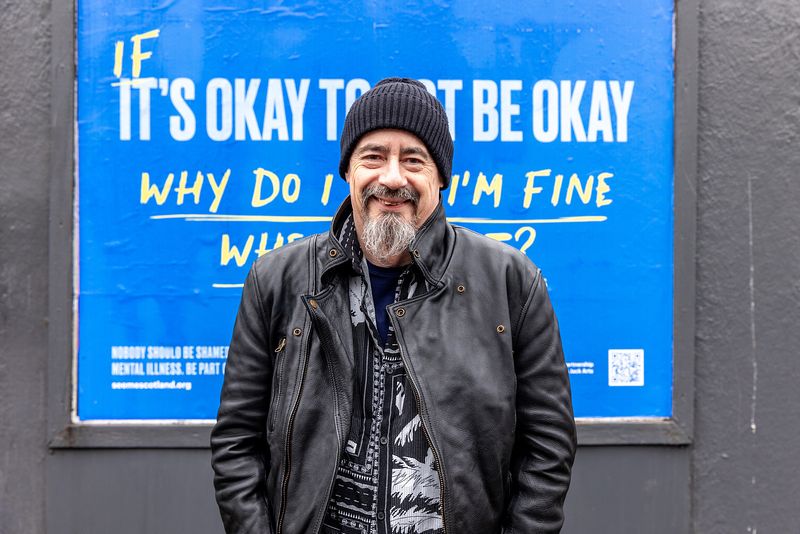Scots say they still feel shamed for living with a mental illness, regardless of the progress to break down mental health stigma
Posted by See Me, 12 March 2024
People surveyed across Scotland say they still feel shamed for living with a mental illness, regardless of the progress over the years to break down the stigma around mental health, according to new research released today.
A survey of 2,002 adults across the UK, including 501 in Scotland, has found that 60 per cent of Scots think there is a great deal or fair amount of shame associated with mental illness, with 51 per cent thinking it across the UK.
The research also found that 64 per cent of Scots, and 59 per cent of adults across the UK, think there is still fear associated with mental illness.
To change this the UK Anti-Stigma Alliance – a partnership between mental health charities across the UK, See Me in Scotland, Mind in England, Inspire in Northern Ireland, and Time to Change Wales – has launched its If It’s Okay campaign.
“It’s okay not to be okay” is one of the most well-used lines in mental health campaigning. But for many experiencing mental illness, this does not always ring true.

In total, 41 per cent of Scots who answered the poll said they had received support or treatment for a mental illness (40 per cent in across the whole of the UK). Of those, 63 per cent1 said they have felt shame associated with their conditions (56%1 across the UK)
As part of the campaign, the partnership is calling on the public to mean what they say when they say, “It’s okay not to be okay”. It also calls on people to challenge shame and discrimination for those living with a mental illness.
See Me volunteer Chik Duncan, from Rutherglen, has found being open with his mental health has helped him, but thinks there is still work to be done to change how people react when someone says they have a mental illness.
He said: “For myself, I’m open about my mental health, my mental illness, my mental difficulties. So, that’s a behaviour I’ve changed. Many years ago, I decided it was so much easier just to be completely open about the fact I struggle with obsessive-compulsive disorder, and I find that that usually helps people as it de-fuses situations that might otherwise be difficult.

“Gradually, I became much more comfortable about it. It didn’t mean I liked having an illness, but I became more comfortable with the fact I had that illness, and became less concerned about what other people thought of me.
“We have to stop being so judgemental about people, then somebody with a difficulty won’t feel so much shame.
“I think the most important thing is your reaction to finding out someone has a mental health problem – whether they tell you, or you find out in another way. Don’t overreact, and definitely don’t show horror! People will often feel shame because of their own internal thing. But, just react as if it’s not a big thing.”
Individuals from all over the UK and Ireland have outlined their experiences and, from today, the partnership is sharing these on billboards in 150 sites in Wales, Scotland, England and Northern Ireland, as well as on social media.
The study also revealed that 15 per cent of Scots surveyed would be concerned about working alongside someone who is living with mental illness (20 per cent across the UK), with over half (54 per cent) of respondents in Scotland agreeing that people experiencing mental ill health are portrayed negatively in the media.
Positively, 83 per cent of Scots surveyed do not think that people with mental health problems should be ashamed of their illness (69 per cent across the UK).
Campaigners say these findings cement the view that everyone in Scotland has a role to play in ending shame around mental illness, from the language we use in day-to-day life to challenging stigmatising behaviours we come across.
Wendy Halliday, See Me director, said: “This polling builds on previous research we carried out into mental illness stigma in Scotland, showing that people continue to feel ashamed of their diagnosis, that they can regularly be shamed by family members, in their communities, in work and when engaging with services.
“This campaign, designed with people with experience of mental illness, seeks to remind people who may be struggling that they shouldn’t have to feel shame. It encourages all of us to think about how we can change our attitudes and behaviours to be sure we are not shaming people due to their illness.
“By reflecting on our own attitudes and behaviours, we can develop self-awareness and play our part in preventing others from feeling shame.”
For information about If It's Okay, including advice and information for anyone living with mental ill health, visit our If It's Okay page.
Follow the conversation on social media via #IfItsOkay.
